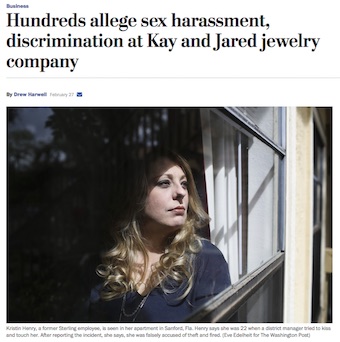|
|
Every Kiss Begins with Kay.
The familiar advertising catchphrase and its accompanying jingle play off the fact that the word “kiss” begins with the letter “K.” “Kay,” of course, is the name of a chain of retail jewelry stores. (Along with its sister company Jared, Kay is owned by parent company Sterling Jewelers.)
This snappy jingle has taken on quite a different context since it was revealed in The Washington Post this week that Sterling is the target of a class-action lawsuit by 69,000 current and former employees alleging a corporate culture of sexual harassment of female employees by male superiors in addition to a significant gender wage gap.
 |
Sterling fired back, labeling the media reports “distorted and inaccurate.” The company’s statement charged that “None of the 69,000 class members have brought legal claims in this arbitration for sexual harassment or sexual impropriety…The only claims certified to proceed on a class-wide basis relate to alleged gender pay and promotions discrimination.” Still, Shares of Signet Jewelers (of which Sterling is a wholly owned subsidiary) closed down more than 12 percent earlier this week amid the news reports of arbitration between the two parties.
As a company whose livelihood and profits relies on tugging at the heartstrings, it’s understandable why the headlines of crass behavior, intimidation, and treating women as second class citizens have already put a dent in earnings.
As much as we in the communications business place a premium on how information is conveyed and rightfully so, serious problems with corporate culture (e.g. Wells Fargo) are repaired, not through rhetoric, but through honest self-examination followed by a fundamental change in operations.
It’s worth noting that the arbitration claim that alleges the inequities in pay and promotion was first filed nine years ago, in 2008. So while Sterling may or may not have already addressed certain areas of concern, here are some key messages that would be helpful for Sterling to communicate to its key constituencies, including current and future employees and, of course, their customers who have plenty of choices when it comes to shopping for jewelry.
Apologize: Sterling doubled down in its statement, saying “We have thoroughly investigated the allegations and have concluded they are not substantiated by the facts.” The thing to remember is: An apology is not tantamount to admitting guilt. Expressing that you’re sorry there were valued team members who had a negative work experience or felt they were treated unfairly would have been a smart move in this case and would have portrayed some compassion for the tens of thousands of long-time employees who have joined the class action suit.
Zero tolerance: Sterling insists the company “takes any concerns seriously and had - and continues to have - multiple processes in place to receive and investigate allegations of misconduct.” So where was the issue or, at the very least, miscommunication? Were processes not adequate, their implementation lackluster? If 69,000 employees claim your company engaged in discriminatory practices, surely more explanation is necessary to prove the company addresses these issues adequately. If there has been workplace sensitivity training, why not say so? If there hasn’t been, now is the time.
Review your pay practices: Communicate what your company is doing to close the wage gap and take a leadership role in the industry. This means crunching compensation data, using a variety of recruitment techniques and ensuring promotion requirements include measurable goals. These are all ways to demonstrate to internal and external audiences that yours is a company that cares, really cares, about fairness and equality when it comes to pay. Sterling hasn’t addressed the pay issue other than to say they take the allegations “very seriously.”
Visible support of Women’s causes: While the bottom line value of Corporate Social Responsibility initiatives continues to be debated, there is surely reputational currency earned by numerous good needs. Jared’s and Kay’s Giving Back pages note their generous support of organizations such as St. Jude Children’s Hospital, the American Diabetes Association and the Diamond Empowerment Fund. All worthy causes, but none speak to the group Sterling is accused of marginalizing: women. Sterling’s genuine support of nonprofits dedicated to women’s health and career mentoring, for instance, would go a long way towards helping repair Sterling’s tarnished image.
***
T.J. Winick is a Vice President at Solomon McCown & Company. Prior to SM&, T.J. was a correspondent for ABC News based out of Washington, D.C. and New York City.

 T.J. Winick
T.J. Winick

 Have a comment? Send it to
Have a comment? Send it to 
No comments have been submitted for this story yet.